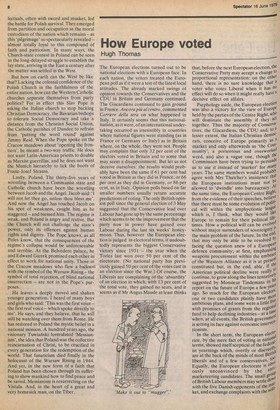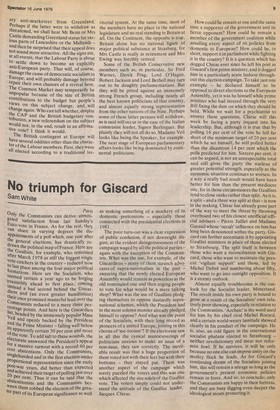How Europe voted
Hugh Thomas
The European elections turned out to be national elections with a European face. In each nation, the voters treated the European poll as if it were a test of the latest local attitudes. The already marked swings of opinion towards the Conservatives and the CDU in Britain and Germany continued. The Giscardiens continued to gain ground in France. Ancora pia al centro , commented Corriere della sera on what happened in Italy. It certainly seems that this nationalisation, as it were, of an international undertaking occurred as irresistibly in countries where national figures were standing (as in France or Germany or Italy) as in Britain where, on the whole, they were not. People may complain that only 32 per cent of the electors voted in Britain and to some that may seem a disappointment. But let us not deceive ourselves: the results would probably have been the same if 61 per cent had voted in Britain as they did in France, or 66 per cent as they did in Germany, or 86 per cent, as in Italy. Opinion polls based on far smaller numbers usually return accurate predictions of voting. The only British opinion poll since the general election of 3 May suggested that the Conservative lead over Labour had gone up by the same percentage which seems to be the improvement that the party now in power have gained over Labour during the last six weeks' honeymoon. Thus, however the European election is judged in electoral terms, it undoubtedly represents the biggest Conservative victory since 1931 — the year when the Tories last won over 50 per cent of the electorate. (No national party has previously gained 50 per cent of the votes cast in an election since the War.) Of course, the Liberals are complaining of the 'absurdity' of an election in which, with 13 per cent of the total vote, they gained no seats, and it seems as if Mr Angus Maude at least thinks that, before the next European election, the Conservative Party may accept a change to proportional representation: on the other hand, there is no sure knowledge that a voter who votes Liberal when it has no effect will do so when it might really have a decisive effect on affairs.
Psephology aside, the European election was also a victory for the view of Europe held by the parties of the Centre Right, NO° will dominate the assembly if they act together. Thus the majority of Conserva" tives, the Giscardiens, the CDU and, to a lesser extent, the Italian Christian democrats, conceive of Europe primarily as a market and only afterwards as 'the Corn' munity', a portentous and overworked word, and also a vague one, though the Commission have been trying to persuade us to use it instead of 'market' for tnanY years. The same members would probablY agree with Mrs Thatcher's insistence that the European institutions must not be allowed to 'dwindle' into bureaucracy. At the same time, the European Centre Right' from the evidence of their speeches, believe that there must be some evolution of Political will within the amphyctionic league which is, I think, what they would like Europe to remain for their political life; times. How a political will can be evolve° without major surrenders of sovereigntY the main problem of the future. In the ell°' that may only be able to be resolved hY facing the question anew of a European defence community; at first, emphasising weapons procurement within the embraeet of the Western Alliance as it is at pre' constituted but, in the end, able, if the American political decline were reallY continue, to grow along the lines tentative'? suggested by Monsieur Tindemans in his report on the future of Europe a few years ago. So much for the European electors:e one or two candidates plainly have mote ambitious plans, and some were a little frei with promises of grants from the region°, fund to help declining industries — at a when, at all events, the British governnle° . is setting its face against economic interven tionism. In the short term, the European eleetn; rate, by the mere fact of voting in national' terms, showed itself sceptical of the fedecr ist yearnings which, overtly or discreet,'71; are at the back of the minds of most Brit° liberals and of a few conservatives, t°°i: Equally, the European electorate ously unconvinced by the andtio marketeering candidates. The small gr°_,711 of British Labour members may settle d°'1., with the five Danish opponents of the alt, ket, and exchange complaints with the s° ary anti-marketeer from Greenland. Perhaps if the latter were to withdraw as threatened, we shall hear Mr Benn or Mrs Castle demanding Greenland status for various parts of Lancashire or the Midlands — and then be surprised that their appeal does not sound more attractive. All the signs are, at all events, that the Labour Party is about to settle down to become an explicitly anti-European party. That will, of course, damage the cause of democratic socialism in Europe, and will probably damage beyond repair their own chances of a revival here. The Common Market may temporarily be unpopular because of the size of British contributions to the budget but people's views on this subject change, and will change again. Who can tell whether, despite the CAP and the British budgetary contribution, a new referendum on the subject would not, in the end, result in an affirmative vote? I think it would. The British contingent at Europe will have several oddities other than the character of the Labour members. First, they were all elected according to a traditional ter ritorial system. At the same time, most of the members have no place in the national legislature and no real standing in Britain at all. On the Continent, the opposite is true. Britain alone has no national figure of major political substance at Strasburg, for Mrs Castle is really in retirement and Mrs Ewing was forcibly retired. Some of the British Conservative new members such as, in particular, Sir Fred Warner, Derek Prag, Lord O'Hagan, Robert Jackson and Lord Bethell may turn out to be doughty parliamentarians. But they will be pitted against an immensely strong French group, including nearly all the best known politicians of that country, and almost equally strong 'representation from the other nations of the Nine. Perhaps some of these latter persons will withdraw, as is said will occur in the case of the Italian communist leader, Signor Berlinguer. But plainly they will not all do so. Madame Veil looks like being the Speaker, for example. The next stage of European parliamentary affairs looks like being dominated by continental politicians.



































 Previous page
Previous page